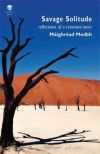 Máighréad Medbh. Savage Solitude: Reflections of a Reluctant Loner.
Dublin, Ireland: Dedalus Press; distributed in the US by Syracuse
University Press, 2013.
Máighréad Medbh. Savage Solitude: Reflections of a Reluctant Loner.
Dublin, Ireland: Dedalus Press; distributed in the US by Syracuse
University Press, 2013.
Savage Solitude is both literary and philosophical, its structure and style enriched by the author's experience in performance poetry and as importantly informed by wide and reflective reading of philosophers of solitude. The result is a thorough, even "savage," exploration poured out by "a reluctant loner" thrust into a merciless world of social conformity and alienation.
The book is structured in multiple ways as a tryptich. First are three dialectical parts: 1. If One is to Live, 2. The Dangerous World, and 3. Perspective. These parts roughly correspond to thesis, antithesis, and synthesis. Within this structure are three voices or personae: One, Other, and I. One is uncompromising, suffering, blunt, driven by instinct and emotion. Other is, the author notes, the "aggregate of wider society," presented in salient quotations of philosophers, religious thinkers, scientists, and writers. The I is the "synthesizing consciousness," the "planning faculty of the brain." In short, these are the voices of Id (One), Ego (I), and Superego (Other) in seamless discussion, sometimes argument, they establish the parameters of alienation and solitude in their varied voices.
At some 250 pages (plus appendices and bibliography), Medbh's work may seem epic in length as it is in excruciating introspection and self-analysis. But the length and detail -- structured as poems, monologues, aphorisms, and dialogues -- read swiftly and consecutively, never dragging or digressing.
If quest and confrontation is the earliest part of any epic, then "If One is to Live" opens the reluctant beginner's quest for psychological survival given the realization -- not bestowed on just anyone -- that the society around one is thick with hypocrisy, rote, and shallowness. In part 1, One thrashes about in disaffected loneliness, while I scrambles for patience and stability:
To be wholly other-defined
is to be sanitized; to be wholly self-defined is to be insane.
This might be what's called depression. I call it insight and
loneliness.
Many loners arrange their lives according to their solitude, making
institutions of themselves.
The I offers valiant reflection challenging the One's assumptions that a lack of social vision, service-orientation, ideology, conviviality, or exemption from suffering is bad for the solitary.
The true loner is embedded
in nature.
Deception and diplomacy are essential to social harmony.
Modern man, said Jung, is a fictive personality with a shadow
instructional side. I see this conflict in the dynamics of every group.
Beyond my constructed activities and goals, there's an immense world in
which there are no aims or plans, only mindless compulsions. That world
is death to my consciousness, but its components are my components, its
sustenance my sustenance. When I'm less "human" I'm more "world."
The tenuous thesis defining the relationship of self and society moves to part 2 and confrontation with the "dangerous world." The recalcitrant One of part 1 having made its case for a suffering self, is carefully muted by the I entering a strange land with caution, not fear. The I responds directly to the hesitations of One:
Deconstruction is the way of
the melancholy and the lone.
Beneath the social niceties there's other work in progress -- the
calculating machinations of politics, the precision of the
intellectual, the reptilian life of the fermion.
Isolation often feels like the only way I can avoid assimilation.
You're a phenomenon like a plant or wild animal with the same
existential rationale. The next move is yours.
I can't measure the benefits of my knowledge for others, but I can
savour its edification in myself.
Part 3 brings perspective, a cobbled synthesis, on the frontier of resolution if not solution: One's question of how to live lingers but with a timorous echo, lacking "rage." Only the I speaks in part 3; One is silenced and Other is assimilated. There is no longer a quest, for a quest would remain as a contrivance.
What distinguishes our lifestyles is that they [monks and mystics] have a belief and a set practice, whereas I have only questions. If their beliefs are facts, I'm as accompanied as they. If not, we're all alone.
The majority accept the prevailing social structures as though they were natural phenomena, fundamentally correct. An outsider, I question all assumptions. I can be a teacher then, reveal them to themselves.
Between the savage self of One and the searching self of I is the "wider society" of great thinkers over time, setting a boundary of authority and wisdom. Most numerous are quotes from Marcus Aurelius, Blake, Rousseau (especially Reveries of a Solitary Walker), Emerson, Thoreau, Whitman, Rilke, Nietzsche, Yeats, Philip Larkin, Eric Hoffer, and Anthony Storr. Sources are conveniently gathered at the end of the book and make a solid core for pursuit of the topic of solitude.
CONCLUSION
Savage Solitude
is a compelling exploration of self, an unusual combination of literary
art forms that achieves a well-rounded discussion of a
perennial subject. Medbh's voices are skillful perspectives that help
round out the existential side of solitude and the solitary.
